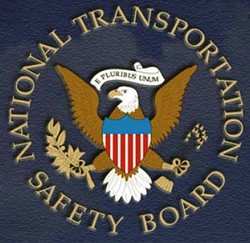Sat, Sep 26, 2009
Hersman Says They Will "Prevent Accidents And Save Lives"
 In a letter to the Secretary of
Health and Human Services Kathleen Selibus, NTSB Chair Debora
Hersman has offered four recommendations for the providers of
medical helicopter services. The recommendations follow the
investigations of recent accidents, which reached record numbers in
2008.
In a letter to the Secretary of
Health and Human Services Kathleen Selibus, NTSB Chair Debora
Hersman has offered four recommendations for the providers of
medical helicopter services. The recommendations follow the
investigations of recent accidents, which reached record numbers in
2008.
Hersman says in the letter that there were 12 accident involving
HEMS aircraft in 2008, and that eight of those accounted for 29
fatalities. The services were the subject of an NTSB hearing in
February, and the recommendations are derived in part from
testimony given at those hearings. "Topics examined were flight
operations procedures including flight planning, weather minimums,
and preflight risk assessment, as well as safety-enhancing
technology such as TAWS and NVIS. Flight recorders and associated
flight operations quality assurance programs were also discussed,"
Hersman wrote. "Training, including use of flight simulators, was
discussed at length, as well as corporate and government oversight
of HEMS operations.
One of the principal issues to arise during those hearings was
the matter of reimbursement. HEMS services are not covered by
insurance companies unless a patient is actually transported, which
Hersman says motivates the companies to transport patients to
generate revenue. "the NTSB is concerned," she wrote, "that the
current reimbursement strategy used by CMS (Centers for Medicare
& Medicaid Services) serves as a disincentive for some HEMS
operators to make capital investments or other improvements that
would increase the level of transport safety provided and thereby
reduce risk."
"To that end," she continued, "the NTSB believes that a CMS
reimbursement structure requiring compliance with safety standards
that incorporate HEMS safety recommendations issued by the NTSB
since 2006 would encourage HEMS operators to increase their level
of flight safety to best industry practices rather than minimum
legal requirements."

Debora Hersman
Hersman made the following recommendations on behalf of the
NTSB:
- Evaluate existing helicopter emergency medical services (HEMS)
reimbursement rate structure to determine if reimbursement rates
should differ according to the level of HEMS transport safety
provided.
- If the findings from that evaluation conducted reveal that
higher levels of reimbursement are required to increase the level
of safety, establish a new reimbursement rate structure that
considers the level of helicopter emergency medical services
transport safety that is required.
- Develop minimum safety accreditation standards for helicopter
emergency medical services (HEMS) operators that augment the
operating standards of 14 Code of Federal Regulations Part 135 by
including, for all flights with medical personnel on board, (a)
scenario-based pilot training, (b) implementation of preflight risk
evaluation programs, (c) formalized flight and dispatch procedures,
(d) safety management systems, and (e) the installation of Federal
Aviation Administration-approved terrain awareness warning systems,
night vision imaging systems, flight data recording systems for
monitoring, and autopilots if a second pilot is not used.
- Once the accreditation standard requested in Safety
Recommendation A-09-106 is developed, establish a policy that
provides Medicare reimbursement for helicopter emergency medical
services (HEMS) transportation only to those HEMS operators that
meet those standards.
Hersman said the NTSB has also issued recommendations to the FAA
to improve the safety of HEMS operations, including installation of
the safety equipment outlined in the letter. She said the NTSB
expects the FAA to enact changes in the safety requirements for
HEMS operators in response to these recommendations.
More News
Aero Linx: International Flying Farmers IFF is a not-for-profit organization started in 1944 by farmers who were also private pilots. We have members all across the United States a>[...]
From 2017 (YouTube Version): Remembrances Of An Israeli Air Force Test Pilot Early in 2016, ANN contributor Maxine Scheer traveled to Israel, where she had the opportunity to sit d>[...]
"We renegotiated what our debt restructuring is on a lot of our debts, mostly with the family. Those debts are going to be converted into equity..." Source: Excerpts from a short v>[...]
Also: B-29 Superfortress Reunion, FAA Wants Controllers, Spirit Airlines Pulls Back, Gogo Galileo Van's Aircraft posted a short video recapping the goings-on around their reorganiz>[...]
Chart Supplement US A flight information publication designed for use with appropriate IFR or VFR charts which contains data on all airports, seaplane bases, and heliports open to >[...]
 ANN's Daily Aero-Linx (04.15.24)
ANN's Daily Aero-Linx (04.15.24) Classic Aero-TV: 'No Other Options' -- The Israeli Air Force's Danny Shapira
Classic Aero-TV: 'No Other Options' -- The Israeli Air Force's Danny Shapira Aero-News: Quote of the Day (04.15.24)
Aero-News: Quote of the Day (04.15.24) Airborne 04.16.24: RV Update, Affordable Flying Expo, Diamond Lil
Airborne 04.16.24: RV Update, Affordable Flying Expo, Diamond Lil ANN's Daily Aero-Term (04.16.24): Chart Supplement US
ANN's Daily Aero-Term (04.16.24): Chart Supplement US




